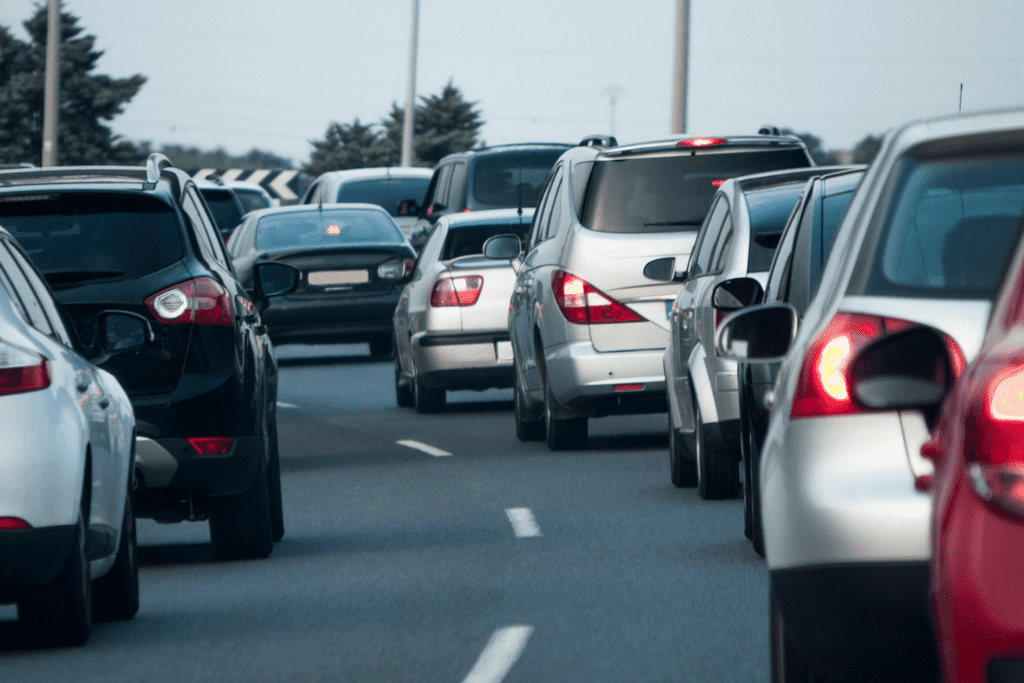It’s that time of the year again – and for many of us it means hitting the road to visit friends and family, or having a mini break.
That sounds great – but everyone else is having the same idea, meaning traffic jams, accidents, and general car-related chaos. Coupled with the good old British weather, not to mention the shocking state of our roads right now (pothole anyone?), then us Brits on the go might be facing some not so ideal situation this Easter.
Experts are already warning that a record number of UK drivers will be hitting the road for the holidays, with nearly 17 million leisure trips expected to take place over the Easter break, with close to 3 million drivers taking to the motorways on Good Friday alone. Expect chaos!
Large amounts of traffic will be extra problematic due to the state of the UKs roads. Recent research we commissioned showed that Britain’s roads are in a high state of disrepair, with 94 percent of drivers admitting that their local councils needed to take action on potholes and other issues. These poor roads, combined with a high volume of traffic, and heavy rain forecast, means the roads could be a treacherous place this bank holiday.
Our founder, Nick Zapolski, said that he expected a high rate of road accidents over the holiday period.
“Our study proved that British roads aren’t the best right now, so in heavy traffic we’re bound to see some issues. We believe that being well prepared is half the battle – so we’ve put together some tips to help you stay safe on the roads this Easter.”
Always use Satnav
It may sound obvious, but many people who travel to family or friends don’t bother to check their route beforehand. Even if you don’t think you need the sat nav, it’s sensible to check your journey before you leave to avoid any road closures or accidents. There will be huge traffic jams across the weekend, so power up your phones and keep sat nav on for all journeys, as a more scenic route might save you some time and stress!
Potholes
As previously mentioned, potholes are a massive issue on the UK’s roads right now, and can cause serious damage to your car. If you hit one, pull over somewhere safe and photograph the pothole, documenting where you hit it. It’s vital you report it, so it can be fixed (allegedly!).
Flooded roads and heavy rain
Flash floods can happen very quickly and without warning. If you do get caught out in heavy rain on the road, turn your headlights on and drive to higher ground. Leave twice as much stopping distance as normal between the vehicle in front of you.
Try to avoid standing water if you can, however it is passable if care is taken. If the water is more than 10cm (4 inches) deep, don’t drive into it. If it’s less than 10cm, drive slowly and in first gear to ensure high revs. Once you get through the water, test your brakes immediately.
Car prep
Before you set out on your journey, make sure your vehicle is in tip top shape. Make sure that your air pressure is good, your windscreen fluid is topped up, and keep some items inside it for emergencies. A warning triangle, water, high vis clothing, torch and phone charger are all important items to keep in your vehicle. The weather over Easter in 2023 isn’t as warm as previous years so with night temputrues down to 3 degrees be sure to have some warm clothing, coats and blankets just incase you’re stuck in a jam for hours.
Snacks and Tech
If you’re heading to the coast or have a long journey with your family, it’s best to have food and drink for additional journey time. If you’re like most parents, you’ll have a snack bag at the ready which also will save you costs instead of buying items at expensive service stops. It’s best to always have a large bottle of water in the boot if you need a drink. You can’t always rely on phone signal or the internet. Most streaming services like BBC iplayer, Sky + and Disney Plus have the option to download content for long journeys, which we wouod advise you to do.
What do to if you break down
Should this happen to you, the very first thing you need to do is alert other drivers to your issue using your hazard lights. Once your hazards are on, and it’s safe to do so, pull over in the most suitable place, avoiding ditches, long grass or soft verges, as you may get stuck.
Once you’re safely stopped, ideally you would place a warning triangle 45 metres behind your car and put on some high visibility clothing, yet most drivers do not carry these items in their cars. If your vehicle is on the road, ensure you remain outside of the vehicle and away from the road. Call breakdown or another professional who can help. If you have no phone signal, wait for another car and flag them down.
Breaking down on a motorway
If you’re in an outside lane, indicate left and move over to the left hand lane. Then move onto the hard shoulder and put your hazard lights on. Exit your vehicle from the left hand side of the car and remain behind the safety barrier. Call national highways on 0300 123 5000, then a breakdown provider and anyone else that needs to know.
What to do if your brakes fail
Put your hazards on immediately and slow your vehicle, using your gears. Once you’ve reached a slow enough speed, use the handbrake to come to a complete stop. Ensure you’re steering your car to a suitable stopping place.
In the worst case scenario, where you’re unable to bring the vehicle to a stop using your gears or brakes, you’ll have to use something to slow you down, such as the kerb or a safety barrier.
Flat tyre/tyre blowout
Calmly pull over in a safe place and put your hazard lights on. A flat tyre can be easily resolved, so make sure you’re carrying a spare or repair kit.
A blow out can be a scary experience, especially as our initial instinct to brake can make it worse. Braking can cause the vehicle to spin, so instead hold the steering wheel firmly and allow the car to slow down itself. Once you have slowed, try to find a safe place to stop and again, put your hazard lights on.
Ensure you know how to change your tyre and it’s safe to do so. If you’re unsure how to change a tyre, or it’s unsafe to do so, call a breakdown provider.
Headlights stop working
If your headlights stop working, don’t stop suddenly, but instead ensure you pull over safely as soon as you can. Use other lights on your vehicle such as hazards, side lights, or even the interior light to ensure visibility.
Once pulled over, try to identify the cause of the problem. If the problem isn’t able to be fixed, call your breakdown provider. If you don’t have any cover, and it’s safe to do so, park your car in a safe place off the road, lock it and return to the vehicle in daylight to fix the issue, or get it towed to the nearest garage.






